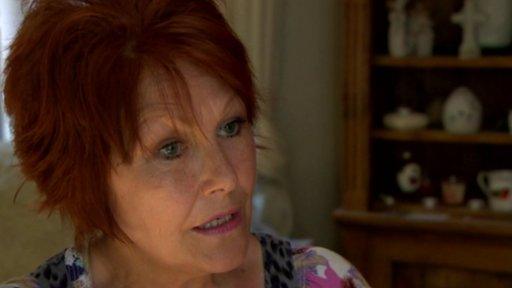HIA inquiry: Victims 'cannot wait' for compensation
- Published

Margaret McGuckin said victims "cannot wait another two or three years" for compensation
The founder of a campaign group has said victims "cannot wait" for compensation after a request was made to extend the Historical Institutional Abuse (HIA) inquiry.
Margaret McGuckin, of Survivors and Victims of Institutional Abuse, said the inquiry should not be "prolonged".
The first minister and deputy first minister are to recommend a one year extension to the NI Executive.
A decision is not expected until the autumn.
The extension request was made by Sir Anthony Hart, chairman of the HIA inquiry.
If the extension is granted, the HIA report may not be published until January 2017.
The extension will require an amendment to the terms of reference of the inquiry, which will be brought before the NI Assembly.
However, Ms McGuckin said victims could be compensated as soon as possible.
"I don't think there is any need for this extra year, but, if there is, and they want to change the terms of reference, then they can change the terms of reference to set up a board and levels of redress and compensation right now," she said.
"I have a brother and he is mentally ill because of what happened to him and in a care home at this time.
"He's not well., he's ill, he wants to get a life and he needs to be compensated for the years of sexual and physical abuse that were meted out to him.
"We cannot wait another two or three years."

Sir Anthony Hart said the extension request was made with "considerable reluctance"
She added: "We're sitting around here waiting and everybody else is getting well paid while they do a job. A good job at that.
"But the inquiry wasn't supposed to be prolonged and all these millions and millions are being paid out for the inquiry when it could be coming to the victims."
'Every effort'
Sir Anthony Hart, chairman of the inquiry, said he made the extension request to Peter Robinson and Martin McGuinness with "considerable reluctance".
He said: "However, on the basis of our experience to date, we are now in a position to calculate how many sitting days it will take to call all the witnesses who wish to give evidence from every institution, and each individual whom we will, or will probably, investigate.
"Should our request for an extension of one year be granted, we will of course continue to make every effort to complete our work in a shorter time should that be possible."
OFMDFM said the inquiry chairman made a "very persuasive and compelling case for a one year extension".
"We do not underestimate the complexities of dealing with institutional abuse.
"We must ensure that the inquiry provides every opportunity for those impacted by the allegations of institutional abuse to be heard in an open forum."
The HIA inquiry's public hearings began on 13 January in Banbridge, County Down.
It is the biggest child abuse public inquiry ever held in the UK, having been contacted by more than 400 people who said they were abused in childhood.
Its aim is to establish if there were "systemic failings by institutions or the state in their duties towards those children in their care".
It will also determine if victims should receive an apology and compensation.
The inquiry was established as a result of a campaign for justice, which gathered momentum in 2009 following the damning findings of a similar institutional abuse inquiry in the Republic of Ireland.